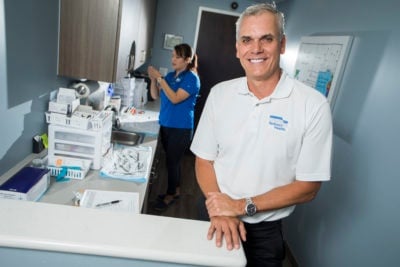Let’s face it. Faster and more immediate communication is changing human behavior. Today:
- 95% of Americans own cell phones, two-thirds are smart phones.
- 30% of people no longer listen to voice mail.
- 75% of millennials prefer to text than talk with customer support.
Spruce’s technology is helping propel Redirect Health’s success in the marketplace.
“We use mobile apps for everything,” says Kevin Malik, director of Redirect Health’s technical healthcare systems. “Healthcare is no exception. The apps give members a highly customized experience, reducing time and cost, and providing better healthcare engagement—more attention for less time and cost.
“It can be confusing when to go to the doctor and what doctor to see,” Malik says. “Using technology to get healthcare from a company that listens to a members’ symptoms and directs them to the medical professionals they need is one of the top goals.”
Redirect Health, President and Founder, Dave Berg adds that mobile apps and virtual video visits give people the ability to get care for many common healthcare issues. “Members can get convenient healthcare from their homes,” Berg says.
How technology is changing member experiences
Leading technology company Spruce Health is propelling Redirect Health’s progressive virtual communication network approach to healthcare. Spruce, founded in 2013, bases the future of healthcare delivery on three key ideas:
- The majority of health encounters will be digital, with patients using mobile devices. Studies suggest as many as 50% of doctor visits could be completed virtually, a percentage likely to rise as innovation continues, with vast potential to improve health and management of chronic disease.
- Traditional healthcare communication is increasingly outdated. Practices have depended on simple phone and fax systems for decades. New advances now allow for smart telephony, including texting, adaptive phone trees and other features that yield vastly more efficient workflows.
- Healthcare communication has become fragmented. New tools for healthcare need to focus on unifying communications, consolidating diverse channels into one place where teams can easily collaborate.
“Spruce is a modern healthcare communication and care platform,” says engineer Kunal Jham. “It helps care teams communicate seamlessly, both with each other and with members, and that means better care and an easier, more delightful experience for everyone.
“When we started the company, we knew that we wanted to power all of the healthcare that occurs outside the four walls of the medical office. And that hasn’t changed. We’ve simply added more ways for that care to happen.”
Today, Spruce’s technology is helping propel Redirect Health’s success in the marketplace. Members will now be able to securely communicate with their care team for their needs, whether via a phone call, secure texting or a video call.
“Eighty-two percent of people now want to contact companies through means other than phone or email, so providing new communication channels is increasingly critical for medical practices to stay relevant and meet member demands,” adds Jham.


